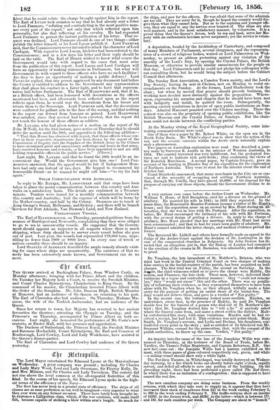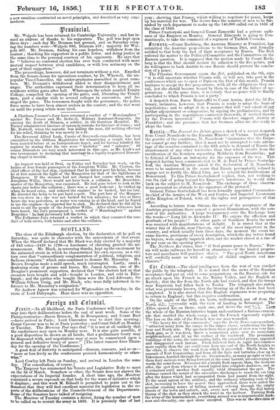C4r 31Ittropotio.
The Lord Mayor entertained Sir Edmund Lyons at the Mansionhouse on Wednesday. A great company was present ; including Sir Charles and Lady Mary Wood, Lord and Lady Overstone, Sir Fitzroy Kelly, Dr. and Mrs. Milman, and Sir Charles and Lady Trevelyan. The oratory did not rise above the level common at the oft-repeated festivities of this kind. In the course of his speech, Sir Edmund Lyons spoke in the high- est terms of the efficiency of the Navy—
The fleet has never been in a greater state of efficiency. The ships of all classes are as near perfection as can well be imagined—very superior to what they ever were on any former occasion. There have lately been brought in- to existence a Lilliputian class, which, if the war continue, will make itself felt, because capable of striking a blow within arm's length. So much for the ships and now for the officers. He was afraid that some of the admirals are too old. They are sorry for it, though he hoped the country would for- give them what they cannot help. But as to the captains and younger offi- cers, they are equal to any the service ever boasted of. The ships are also well manned, and in the most satisfactory manner, by volunteers. It is a proud thing that the Queen's forces, both by sea and land, serve her Ma- jesty with an enthusiastic heroism never surpassed ; yet the service is volun- tary.
A deputation, headed by the Archbishop of Canterbury, and composed of many Members of Parliament, several clergymen, and the representa- tives of a crowd of religious bodies, waited on Lord Palmerston on Wed- nesday, to present an address protesting against any violation of the sanctity of the Lord's Day, by opening the Crystal Palace, the British Museum, or otherwise to provide similar amusements for the people on that day. Lord Palmerston said he could not pledge his colleagues with- out consulting them, but he would bring the subject before the Cabinet Council that afternoon.
The Sunday Rest Association, a Camden Town society, and the Lord's Day Society, having its seat in Chelsea, met on Monday to resist on croachments on the Sunday. At the former, Lord Shaftesbury took the chair ; but when he moved that prayer should precede business, the working men decided most distinctly against the proposition. Where- upon, expressing his surprise and chagrin that he should have been met with indignity and insult, he quitted the room. Subsequently, the meeting carried resolutions in favour of open public institutions on Sun- days. Admiral Harcourt presided over the Chelsea meeting. There the contest was also on the propriety of opening public exhibitions, like the British Museum and the Crystal Palace, on Sundays. But the chair- man could not decide between the conflicting parties.
At the Monday sitting of the Royal Geographical Society, some inte- resting communications were read. One of them was a paper by Mr. Robert White, on the open sea in the North Polar Basin. Mr. White's object was to show that the action of the sun and the oceanic currents within the Arctic circle naturally explain such a phenomenon. Two papers on Australian exploration were read. One described a jour- ney made by Surveyor R. Austin in the interior of Western Australia, in 1804. The country traversed was very indifferent, but the geological fea- tures are said to indicate rich gold-fields ; thus confirming the views of Sir Roderick Murchison. A second pa pier, by Captain Gregory, gave an account of the landing in Blunder Bay of his expedition for the exploration of Northern Australia. They were to start for the interior about the end of October last. Count Strzelecki announced, that many merchants in the City are so con- vinced of the necessity of occupying and settling Northern Australia, that, through Mr. Uzielli, they have placed 10,0001. at his disposal for the purpose of carrying out those objects, should the Government decline to do so.
A very curious case came before the Arches Court on Wednesday. Mr. William Y. Hunt, of Bell Broughton, sued for a divorce on the ground of adultery. He married his wife in 1845; in 1853 they separated. In the mean time, the Honourable Maurice Portman became a visitor at Mr. Hun'ff house ; and the separation arose on an avowal by Mrs. Hunt during an tercatio ,n that she was in love with Mr. Portman. After the separation, as before, Mr. Hunt encouraged the intimacy of his wife with Mr. Portman, with the avowed design of getting a divorce. In reply to the charge of adultery, Mrs. Hunt pleaded that her marriage with Mr. Hunt had never been consummated; and that he had for years been guilty of adultery. Mr. Hunt's counsel admitted the latter charge, and medical evidence proved the former.
The Reverend Mr. Liddell and others have formally made an appeal to the Judge of the Arches Court against the decision of Dr. Lushington in the case of the ornamented churches in Belgravia. Sir John Dodson has di- rected that an allegation put in, that the Bishop of London had consented to the erection of the crosses in St. Barnabas, was admissible, and should go to proof.
Dr. Vaughan, the late incumbent of St. Matthew's, Brixton, who was tried last week m the Central Criminal Court on two charges of making false entries in the b "urial-register of the parish, has been acquitted on both charges. The first trial was on Friday, the second on Saturday. In the fewer, the chief witnesses relied on to prove the charge were Maltby, the sexton, and Plummer, the late clerk. These men, however, delivered their testimony in a vague and contradictory manner : they " could not remem- ber," they "would not swear " this and the other. There was no possibi- lity of rebutting their evidence, as they represented themselves to have been alone with Dr. Vaughan when he, as they alleged, wilfully made a false entry for the purpose of getting an undue share of the burial-fees. The Jury would not believe them, and gave in a verdict of "Not guilty."
In the second case, the testimony looked more credible. Hayden, an undertaker, swore that, in the presence of Maltby, he paid Dr. Vaughan double fees for the funeral of a person who died out of St. Matthew's dis- trict ; that Dr. Vaughan desired him to " tell a lie " if anybody asked where the funeral came from, and name a street within the district. Malt- by. corroborated this story, with some variations. Hayden said he had re- ceived a receipt, but had lost it. This evidence was met point-blank. Mary Smith, Dr. Vaughan's servant, and Lydia and Decima, his daughters, con- tradicted every point in the story ; and so satisfied of its falsehood was Mr. Sergeant Wilkins, counsel for the prosecution, that, with the consent of the parish authorities, he threw up the case. Verdict, "Not guilty."
An inquiry into the cause of the loss of the Josephine Willis was com- menced on Thursday, at the instance of the Board of Trade, before Mr. Yardley, the Thames Police Magistrate, and Captain Robertson R.N. One new fact came out : the Josepine Willis had a lantern exhibited on the mast, with three panes of glass coloured respectively red, green, and white —a sailing-vessel should show only a white-light.
The Pavilion Theatre, in 1Vhitechapel, was totally destroyed on Wednes- day morning, by a fire which broke out shortly before eight o'clock, rapidly spread, and defied all efforts to save any portion of the building. On the preceding night, there had been performed a piece called The Red Crow, m which there was an imitation of a conflagration : this is supposed to have caused the real fire.
The new omnibus company are doing some business. From the weekly returns, with which they take care to supply us, it appears that they have increased their stock of omnibuses from 241 in the week ending February 2, to 260 in the week ending February 9. The traffic-returns show an income of 42391. in the former week, and 46391. in the latter—which is between 171. and 181. for each omnibus per week. The Company are about to " launch" a new omnibus constructed on novel principles, and described-aa very com- modious.



























 Previous page
Previous page